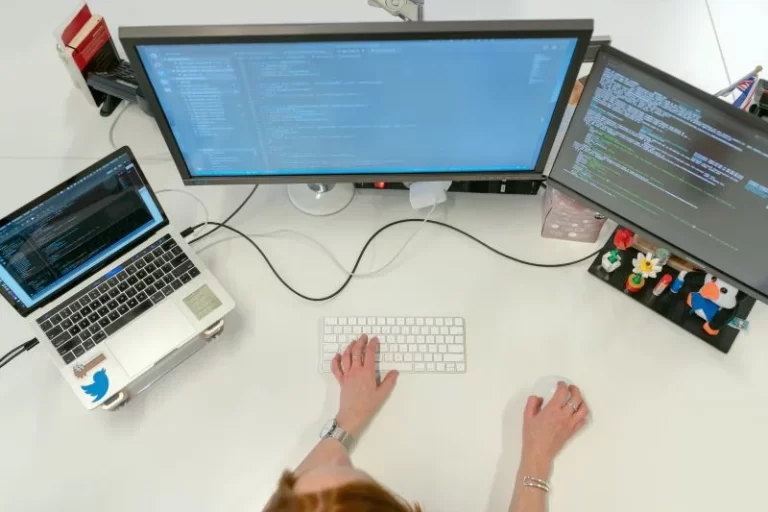Exploring Human-Computer Interaction: Bridging the Gap Between Humans and Technology
Human-computer interaction (HCI) is a multidisciplinary field that encompasses the study of how humans interact with computer technology. It aims to design and develop computer systems that are intuitive, easy to use, and effective in meeting the needs of their users.
HCI principles are applied to a wide range of technologies, from desktop computers and mobile devices to websites, software applications (made by software engineer), and interactive systems.
In an age where technology is seamlessly integrated into our daily lives, the interface between humans and computers plays a pivotal role in shaping user experiences.
Human-Computer Interaction (HCI) stands at the nexus of this interaction, aiming to enhance the usability and accessibility of technology for individuals.
This multidisciplinary field delves into the design, evaluation, and implementation of interactive computing systems, with a primary focus on the user’s needs, behaviors, and experiences.
Understanding Human-Computer Interaction:
At its core, Human-Computer Interaction revolves around understanding how users interact with technology. It encompasses various elements, including psychology, design, engineering, and usability.
The goal? To create intuitive, efficient, and enjoyable interfaces that facilitate seamless communication between humans and machines.
Goals of Human-Computer Interaction:
The primary goals of HCI include:
- User-centered design: Ensuring that technology is designed with the user’s needs and preferences in mind.
- Usability: Creating interfaces that are easy to learn, use, and understand.
- Efficiency: Helping users accomplish their tasks quickly and effectively.
- Enjoyability: Making technology interactions engaging and enjoyable.
- Accessibility: Ensuring that technology is accessible to all users, regardless of their abilities or limitations.
Elements of HCI:
User-Centered Design:
HCI emphasizes designing technology with the user in mind. It involves understanding user behaviors, preferences, and needs to create interfaces that are intuitive and user-friendly.
Usability and Accessibility:
Ensuring that technology is accessible to all individuals, regardless of their abilities or limitations, is a key aspect of HCI. Usability studies focus on making interfaces easy to use and efficient.
Interface Design:
This involves crafting the visual and interactive elements of software and hardware interfaces. It covers everything from the layout and aesthetics to the functionality and responsiveness of the interface.
Cognitive Psychology:
Understanding how humans process information, make decisions, and perceive interfaces is crucial in designing effective HCI. Cognitive psychology principles guide interface design to align with human cognitive capabilities.
Evaluation and Testing:
HCI employs various methods, such as user testing and feedback collection, to assess the usability and effectiveness of interfaces. Iterative testing helps refine designs based on user input.

Why Choose a Career in Human-Computer Interaction?
A career in HCI offers a rewarding and challenging opportunity to be at the forefront of technological innovation. HCI professionals play a vital role in shaping the future of technology, ensuring that it is not only powerful but also user-friendly and accessible to all. Here are some compelling reasons to pursue a career in HCI:
Impactful Design:
HCI professionals have the power to influence how people interact with technology on a global scale. By creating intuitive and user-friendly interfaces, they enhance user experiences and make technology more accessible to a diverse population.
Interdisciplinary Nature:
HCI is an intersectional field that welcomes individuals from diverse backgrounds, including psychology, design, computer science, and more. This multidisciplinary nature allows for collaboration and innovation across various domains.
Evolving Industry:
With the rapid evolution of technology, the demand for HCI experts continues to grow. From mobile apps to smart devices and beyond, there is an increasing need for professionals who can create seamless user experiences.
Solving Real-World Problems:
HCI professionals tackle real-world challenges by improving the usability and accessibility of technology. Whether it’s designing interfaces for healthcare systems or creating inclusive software for people with disabilities, the impact is tangible and meaningful.
High Demand:
The demand for HCI professionals is growing rapidly as technology continues to permeate every aspect of our lives.
Impactful Work:
HCI professionals have the satisfaction of creating technology that positively impacts people’s lives, making tasks easier, communication more effective, and information more accessible.
Creative Problem-Solving:
HCI involves a blend of creativity and problem-solving, as you apply your understanding of human behavior and design principles to create innovative solutions.
Diverse Career Paths:
HCI offers a range of specialized career paths, from user research to interaction design, information architecture, and usability testing.
Competitive Salaries:
HCI professionals are well-compensated for their expertise and contributions to the field.
Career Opportunities in Human-Computer Interaction:
HCI professionals can find employment in a variety of industries, including:
User Experience (UX) Designer:
UX designers focus on understanding user needs and behaviors to create intuitive interfaces. They conduct research, design wireframes, and collaborate with cross-functional teams to develop user-centric products.
User Interface (UI) Designer:
UI designers are responsible for the visual aspects of interfaces, including layout, typography, and color schemes. They work closely with UX designers to ensure that the visual elements align with the overall user experience.
Human Factors Engineer:
Human factors engineers apply principles from psychology and engineering to optimize the interaction between humans and technology. They focus on improving usability, safety, and efficiency in various systems.
Usability Analyst:
Usability analysts evaluate interfaces through testing and user feedback. They identify usability issues and suggest improvements to enhance the overall user experience.
HCI Researcher/Academic:
HCI researchers delve into understanding user behaviors, conducting experiments, and developing theories to advance the field. They often work in academic settings or research institutions.
Software Companies:
Designing and developing user interfaces for software applications, websites, and mobile apps.
Consulting Firms:
Advising companies on how to improve their user experience and make their products more user-friendly.
Government Agencies:
Designing and implementing user-centered government websites, software applications, and systems.
Some other information about this topic is also available here.

Skills and Qualifications for a Career in Human-Computer Interaction:
To succeed in a career in HCI, you should possess a combination of technical, design, and communication skills. Here are some essential skills for HCI professionals:
- User research: Understanding user needs, behaviors, and motivations through various research methods.
- Interaction design: Creating user interfaces that are intuitive, aesthetically pleasing, and effective in supporting user tasks.
Conclusion:
Human-computer interaction is a dynamic and ever-evolving field that offers a promising career path for those passionate about technology and user-centered design.
As technology continues to shape our lives, HCI professionals will play an increasingly crucial role in ensuring that technology is accessible, enjoyable, and beneficial to all.
Now it becomes more pervasive in our lives, the importance of creating intuitive and user-friendly interfaces becomes increasingly evident.
Those passionate about enhancing user experiences, solving real-world problems, and bridging the gap between humans and technology will find a rewarding and fulfilling career path in HCI.
The field offers diverse opportunities for innovation, collaboration, and making a meaningful difference in the world of technology.






